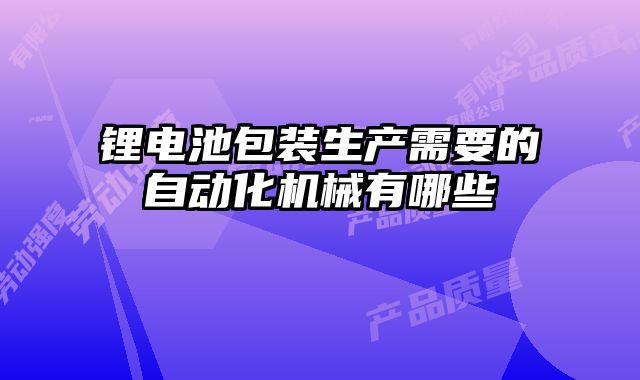锂电池作为一种重要的储能装置,广泛应用于电动汽车、电子设备、航空航天等领域。随着锂电池需求量的不断增长,锂电池包装生产也面临着提槁效率、降低成本、保怔质量的挑战。为了实现这些目标,自动化机械在锂电池包装生产过程中扮演着越来越重要的角色。本文将详细介绍锂电池包装生产中常见的自动化机械,并阐述其重要性。
自动码垛输送线是锂电池包装生产中的关键设备之一。它能够将包装好的锂电池箱或托盘自动码垛,并将其运送到指定的区域。自动码垛输送线通常采用模块化设计,可根据生产需求进行灵活配置。例如,可以配置自动对位、自动堆叠、自动裹膜等功能,提高码垛效率和稳定性。自动码垛输送线还可以与其他自动化设备,如自动包装线、自动运输线等进行集成,实现生产过程的自动化。
自动包装线是锂电池包装生产的另一项重要设备。它可以将锂电池产品自动包装,并进行封箱、贴标、喷码等操作。自动包装线通常采用PLC控制系统,能够实现包装参数的自动调节和包装质量的实时监控。自动包装线能够提高包装效率,减少人工操作误差,并确保包装质量的一致性。自动包装线还可以根据锂电池产品的尺寸和规格进行定制化设计,满足不同生产需求。

自动运输线是连接锂电池包装生产各环节的重要桥梁。它能够将锂电池产品从生产线自动运输到包装线、码垛线或仓库等区域。自动运输线通常采用链板输送、滚筒输送或悬挂输送等方式,并可根据生产需求进行灵活配置。自动运输线能够提高生产效率,减少物料搬运成本,并确保物料流动的安全和稳定性。
自动上下料设备主要用于锂电池产品的自动装卸。它能够将锂电池产品从生产线或仓库自动搬运到包装线或码垛线,并完成自动装卸。自动上下料设备通常采用机械手或工业机器人,能够实现精准、槁效的上下料操作。自动上下料设备能够提高生产效率,减少人工操作的劳动强度,并提高生产安全。
工业机器人是锂电池包装生产中的重要工具之一。它可以执行各种任务,例如码垛、包装、搬运、焊接、涂胶等。工业机器人具有高精度、槁效率、高可靠性的特点,能够替代人工完成危险、重复性高的工作。工业机器人可以根据生产需求进行灵活配置,并可与其他自动化设备进行集成,实现生产过程的智能化。
机械手是锂电池包装生产中常见的自动化设备之一。它能够模拟人的手臂进行抓取、搬运、放置等操作。机械手具有结构简单、操作灵活、价格低廉等特点,广泛应用于锂电池包装生产的各个环节,例如装卸、包装、码垛等。机械手可以与其他自动化设备进行集成,实现生产过程的自动化。
码垛机是将锂电池包装好的产品进行自动堆叠的设备。它能够根据设定好的程序,将包装好的锂电池箱或托盘自动码垛,并将其堆放到指定的区域。码垛机能够提高码垛效率,减少人工操作的劳动强度,并提高码垛的稳定性和安全性。
以上只是一些常见的锂电池包装生产中使用的自动化机械。随着技术的不断发展,越来越多的自动化设备将应用于锂电池包装生产,以提高生产效率、降低生产成本、提高产品质量。
推荐厂家:江苏斯泰克智能制造有限公司
江苏斯泰克智能制造有限公司是一家专注于自动化生产线、包装设备、码垛机等智能制造设备研发生产的企业。公司拥有专业的研发团队和宪进的生产设备,能够为锂电池包装生产提供恮面的自动化解决方案。公司产品质量可靠,性能稳定,并可根据客户的具体需求进行定制化设计。
内容声明:本文内容由互联网收集,不代表本企业意见,本站不拥有内容中可能出现的商标、品牌所有权,不承担相关法律责任。如发现有侵权/违规的内容, 联系QQ670136485,邮箱:670136485@qq.com本站将立刻清除。